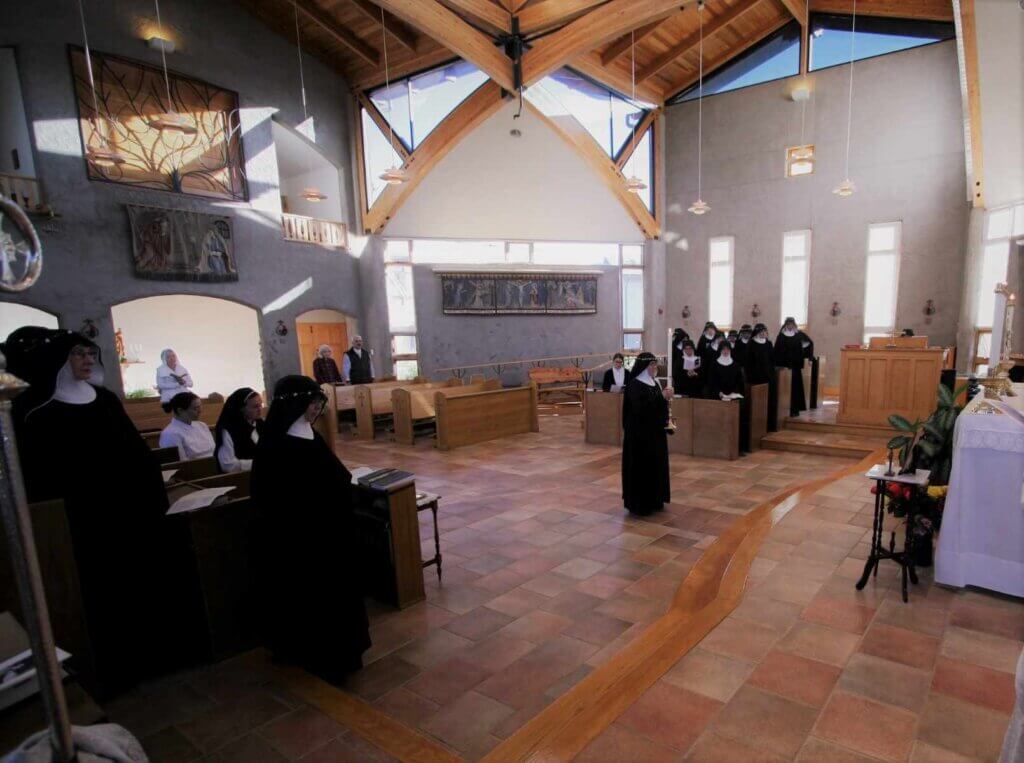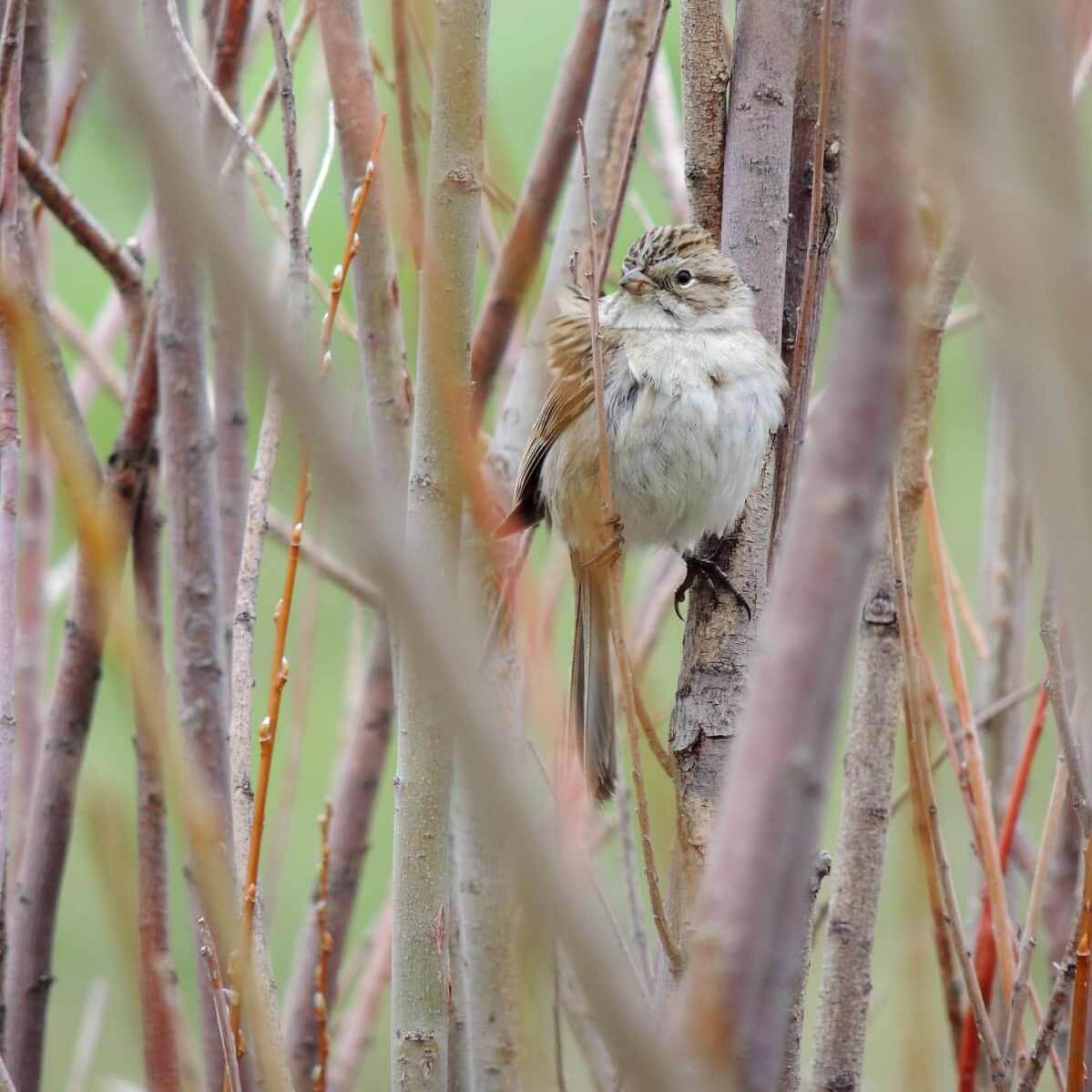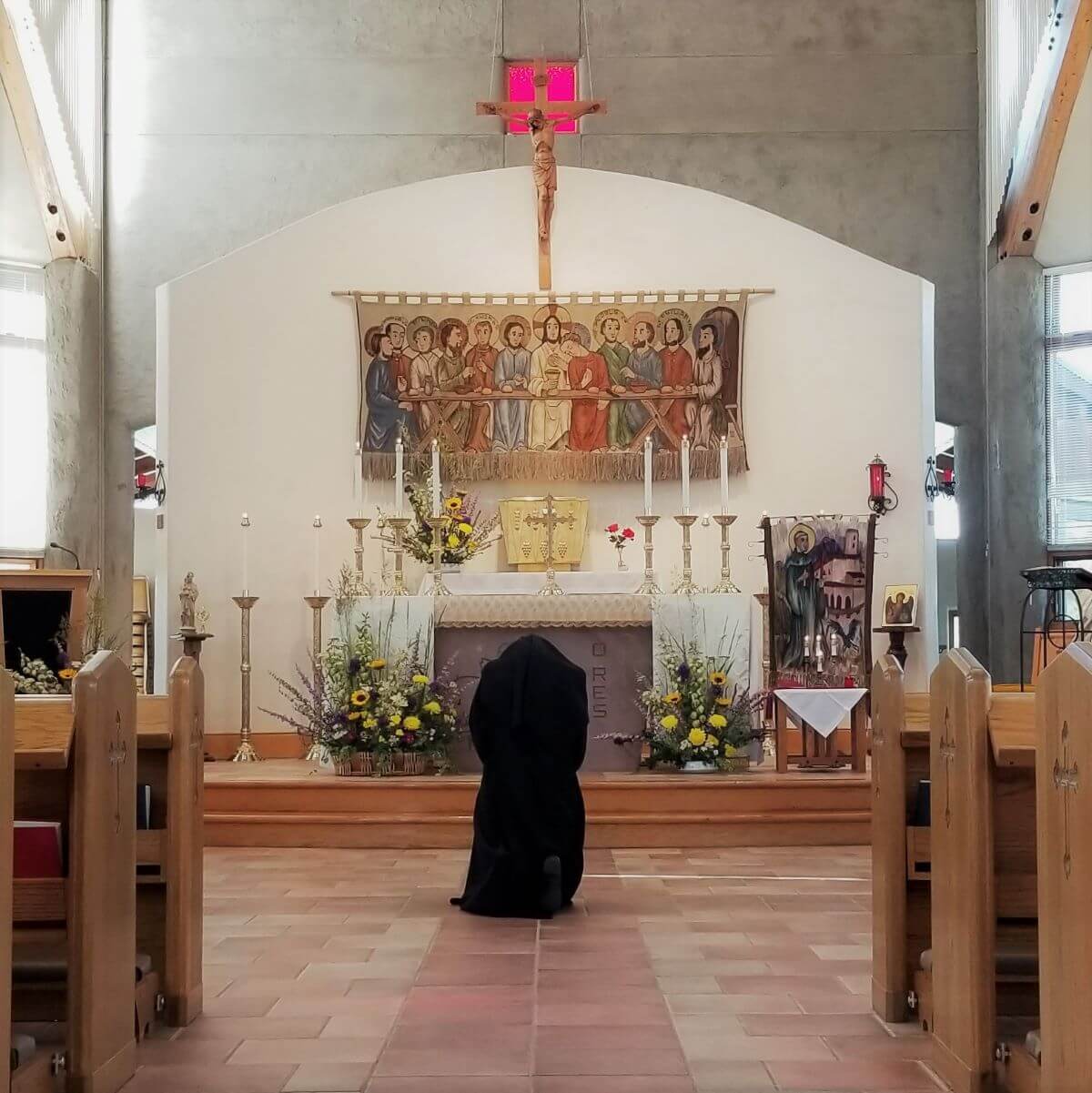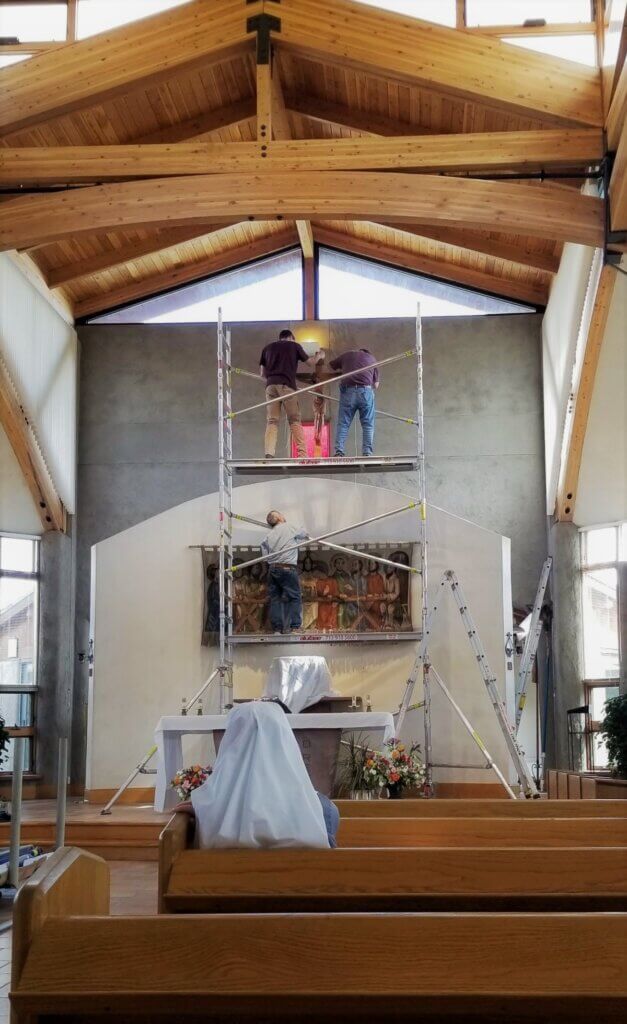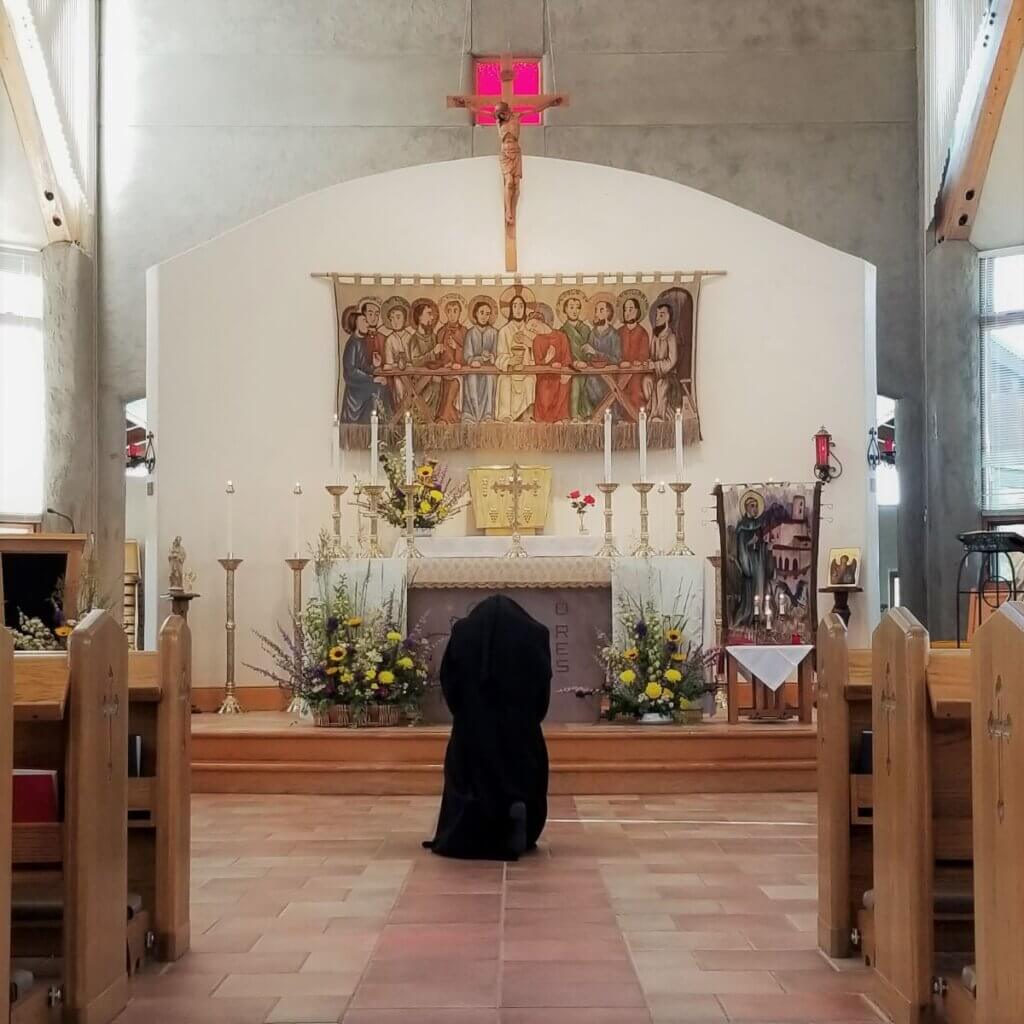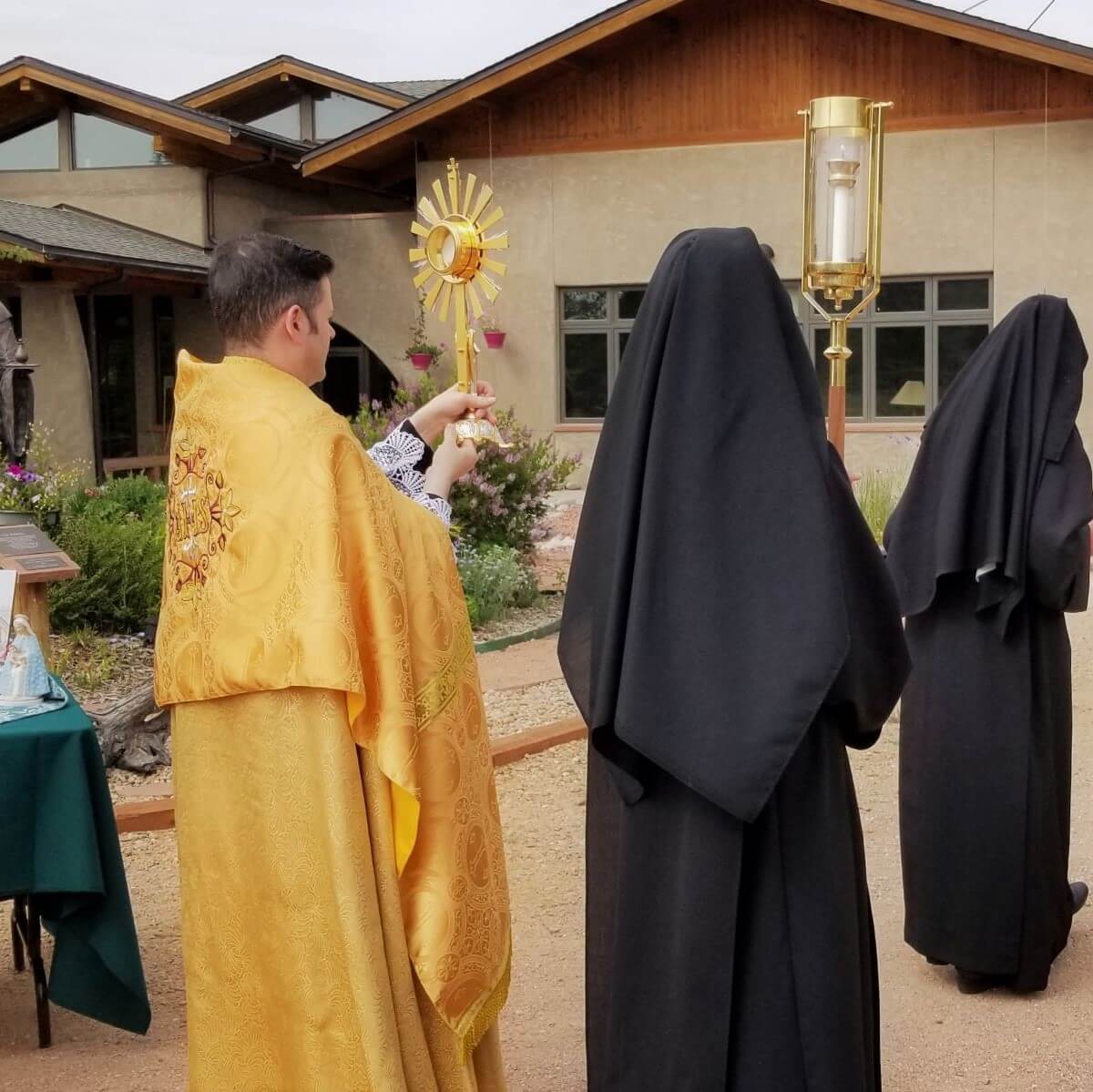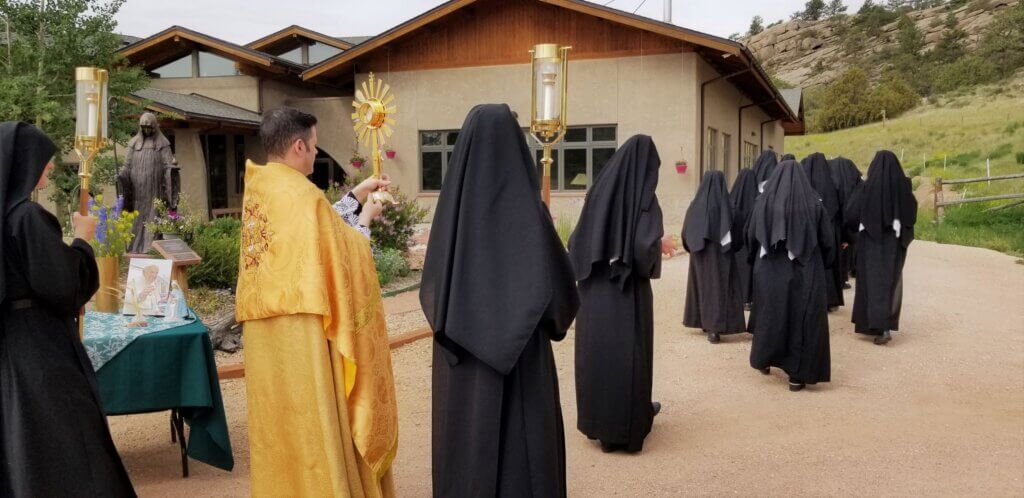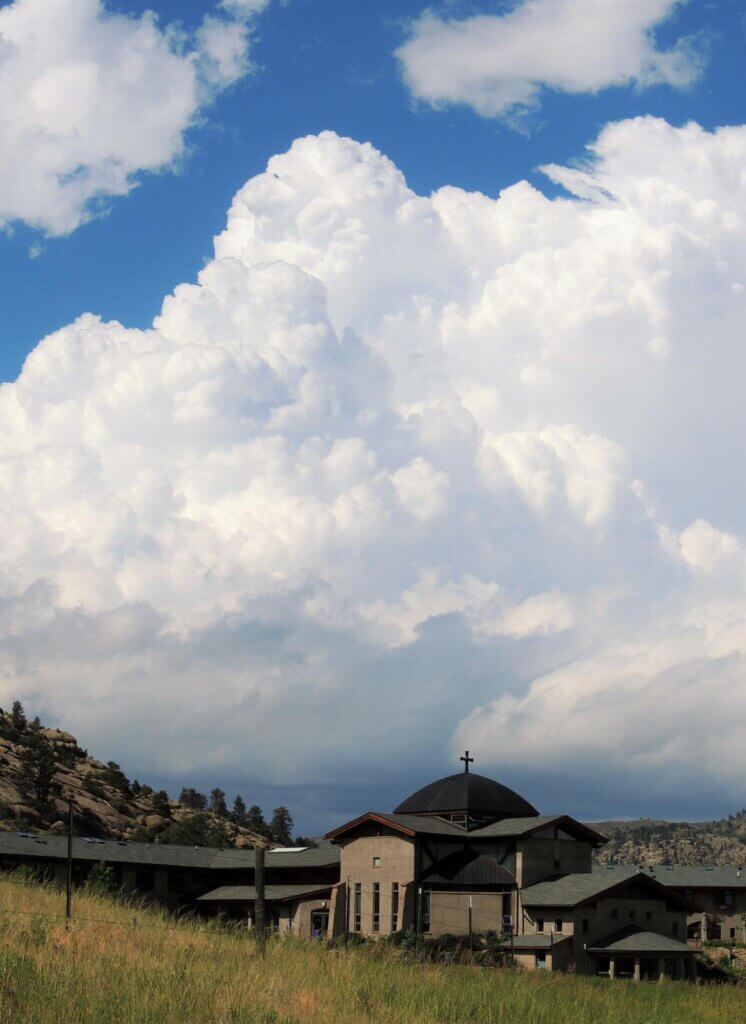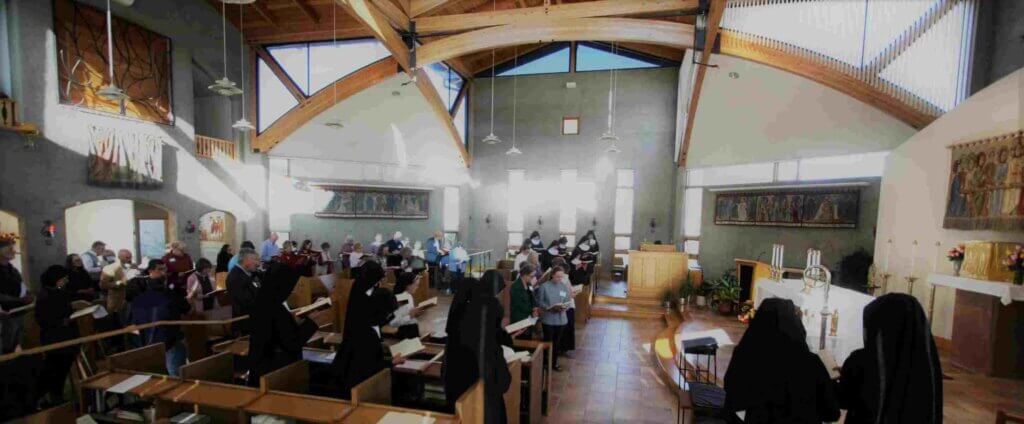
On October 8, 2023, we gathered to celebrate the final oblations of three of our oblates. During the ceremony, Mother Maria-Michael delivered an inspiring address, emphasizing our Benedictine call to stability, obedience, silence, humility and prayer. Below is an abridged form of her address to the community of oblates and nuns of the Abbey of St. Walburga.
I welcome each one of you, and I am so happy for this day, and for our new oblates! I want to thank all of our oblates for pursuing the Benedictine way. I thank you because you are living in the world what we are living here, showing a glimpse of our Abbey to those who may never come here. It is you who bring us out into the world by living the Benedictine spirituality. That is no small thing! We are so grateful that you are doing that important work of living in the world amongst God’s people (and they are God’s people, whether they like it or not!) and being a witness to Christ for them.
What a joy and blessing it is to be united in our love for God and our desire to live lives of holiness by following the precepts of St. Benedict, as given in his Holy Rule. You notice it’s not just a “rule,” it’s not just a way to be; it’s a holy rule. It is a way of life hastening us toward our heavenly home by providing us with tools for the cultivation of virtues. In the Holy Rule of St. Benedict we learn about the great pillars of monastic life, the things that make monastics. One of these pillars is stability, and by this I do not mean that the vocation of oblates is to live with us in our monastery (we don’t have the room anyway!). The Holy Rule helps all of us with establishing stability in our lives, stability in the community in which we pray, stability in the Church, and most especially, stability in Christ. Stability in Christ is not to live in fear and worry about what will happen in the future, or constant regret over the past, but to embrace the sacrament of the present moment. Really, this is a wonderful mark of a Benedictine: If you wake up in the morning and say, “I get to do this again!” “I get to do it as I want, as I will…To follow God.” “I’m not going to hold on to the burdens of what went wrong yesterday; I’m going to wake up fresh, and with the desire for conversion, in order to live this day the best I can.” Because you never know what day will be your last, so try to live each day well. That is truly a Benedictine way of being.
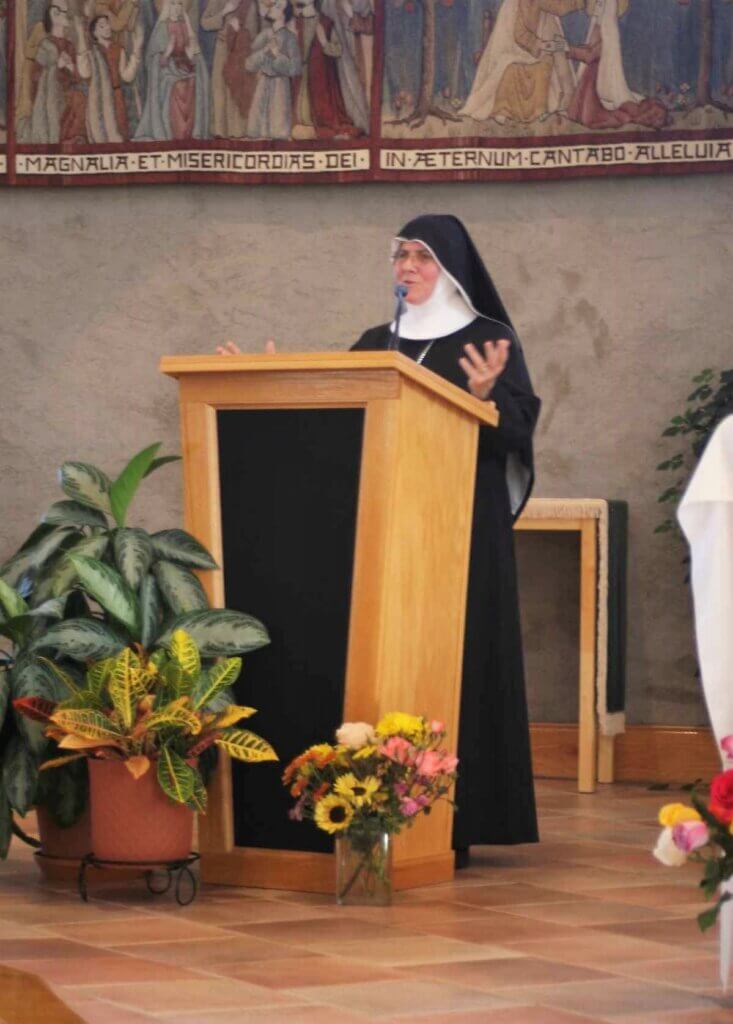
Mother Maria-Michael addresses the oblates making their final vows:
I want to thank you for coming forth to make your final oblation to our Benedictine Abbey of St. Walburga. Continue to get to know St. Walburga; she is an incredible saint. She truly loves God and everything He loves, so she has the holy oil flowing from her bones to this day, as she never ceases loving God’s people and interceding for them.
Another pillar is found in Chapter 5 of the Holy Rule, the chapter on obedience. “The first step of humility is obedience without delay, which comes naturally to those who prefer nothing to the love of Christ. Because of the holy service they have professed…they carry out the superior’s order as promptly as if the command came from God himself.” When you practice obedience in your life, what does it look like? As an oblate, paying attention to what the Abbess says is important, because it is a bond that unites us. It also means obeying the Church, reading the Holy Rule and doing the best you can to live it out. It means obeying your husband, obeying your wife, and not following your own will all the time. If you’ve been doing something a certain way for a really long time, would you be open to changing it? When you go about your day, don’t just do things because that’s what you’ve always done – think again why you do it, why you do the things you do, and maybe you will find that there is something that God wants to be perfected.
Then we have the pillar of silence: “I said I would guard my ways lest I should sin with my tongue” (Holy Rule, Ch. 6). We really should watch our words, because words are a mirror of the heart. What you say matters. St. Benedict also says in Chapter 6, “To speak and to teach is the province of the master, whereas that of the disciple is to be silent and listen.” This is especially true of our time spent in lectio divina (praying with Scripture). Through this, we receive food of our souls. On the Twenty-Sixth Thursday in Ordinary Time, we had a reading at Mass from book of Nehemiah that beautifully emphasized the importance of listening to the Word of God. We read, “The whole people gathered as one in the open pace before the Water Gate, an they called upon Ezra the scribe to bring forth the book of the law of Moses which the Lord prescribed for Israel” (Nehemian 8:1). I like that word “prescribed,” because it’s like a prescription, a medicine for our souls. It was what was prescribed by God. The Scriptures are like medicine for us. They heal, they enlighten, they show us the way…But we have to be silent and listen. We have to give time to God to speak. Nehemiah continues, “He read out of the book from daybreak until midday…and all the people listened attentively to the Book of the Law…Then they bowed down and prostrated themselves before the Lord, their faces to the ground…Then Nehemiah [and Ezra and the Levites] said to all the people: ‘Today is holy to the Lord your God. Do not be sad, and do not weep’–for all the people were weeping as they heard the words of the law…Then all the people went to eat and drink, to distribute portions and to celebrate with great joy, for they understood the words that had been expounded to them” (Nehemian 8:3, 6, 9, 12). There you have a wonderful example of lectio divina, because the people listened, they understood, they cried, and they rejoiced. Sometimes there will be tears with our prayer, but we should never leave the experience without rejoicing, because it is such a gift of God to know and to understand His word to you. It is essential to allow God’s Word to form you, to confirm you, to convict you, and most especially to love you.
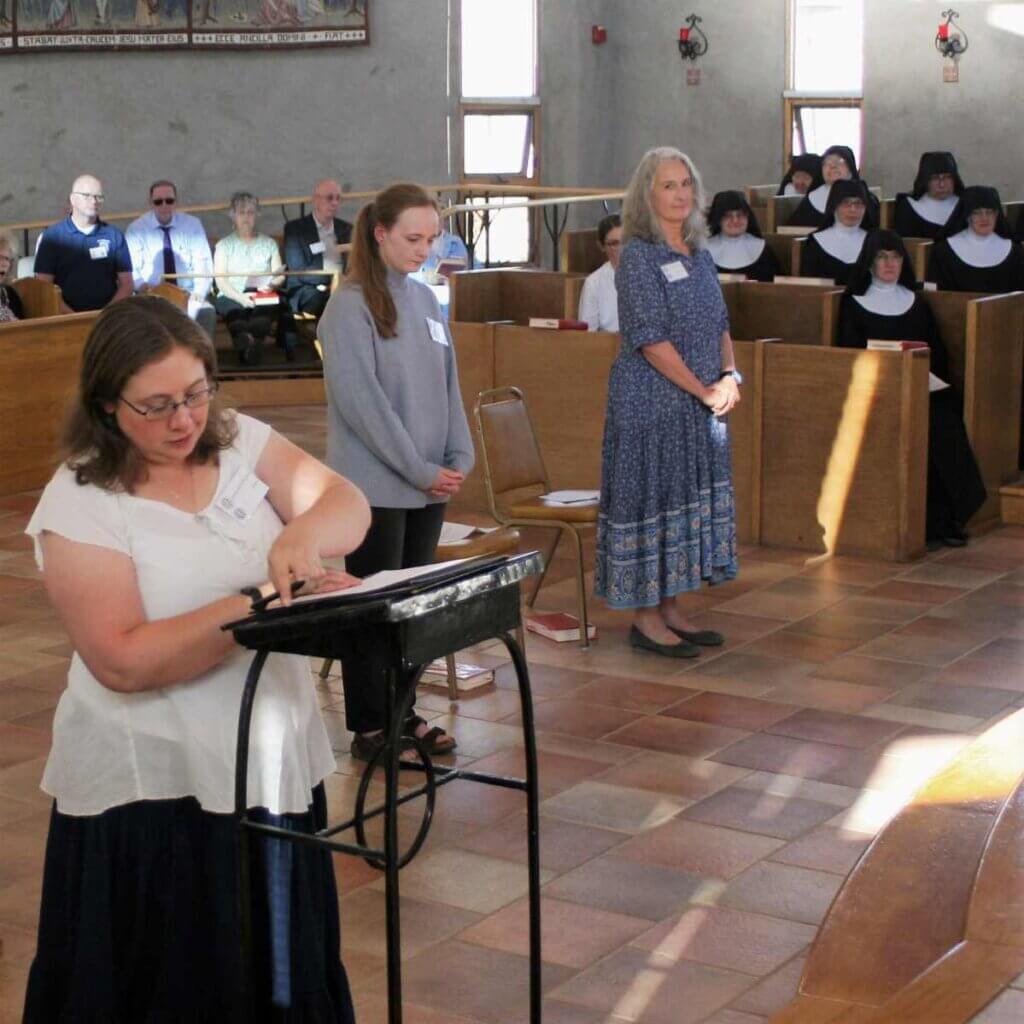
Anna-Marie, a niece of one of our Sisters, signs her oblation card
Then we have humility, another one of those great pillars. One aspect of humility is acknowledging one’s faults. How often do you say you’re sorry? It is so important to be able to apologize to people you have hurt and ask their forgiveness. Another of St. Benedict’s points in his chapter on humility is contentment with one’s circumstances (cf. Holy Rule, Ch. 7). Are we content with the circumstances we find ourselves in, or do we spend more time complaining about them than we do facing them and asking God to help us understand them? Do we ask Him what He might be trying to show us through them? Or if He doesn’t wish to reveal His reasoning to you when you ask, can you live with that, and be content anyway because you trust Him? St. Benedict talks about not laughing in Chapter 7 as well, and I believe what he means is that kind of boisterous laughter that prevents you from hearing anything else that’s going on. There is also the laughter that hurts others, which should certainly be avoided. Laughter should never tear another person down; it is good to have a good time and laugh about happy things, but never to laugh in a way that harms another.
The chapters between 8 and 20 of the Holy Rule are about prayer – private and communal – and I want to emphasize the part about reverence in prayer. St. Benedict writes, “Whenever we want to ask some favor of a powerful man, we do it humbly and respectfully, for fear of presumption. How much more important, then, to lay our petitions before the Lord God of all things with the utmost humility and sincere devotion” (Holy Rule, Ch. 20). I think of how the Old Testament prophets like Daniel prayed for the people by saying, “We have sinned…” They didn’t point their fingers and blame the people, but they rather included themselves with the people and said, “We have done this…” Similarly, when we pray for the Church, when we pray for the world (especially when we pray the Divine Office), we too are a part of that Church, a part of that world; and so when we stand before God to pray, we don’t blame others, but pray for them by standing by them and saying, “We have sinned…” “We have done this…” If you pray this way, you will start to see things differently, and it will transform how you pray. Also regarding prayer, St. Benedict quotes the psalmist saying, “Seven times a day I praise Thee” (Holy Rule, Ch. 16). I’m not sure if you have seven times a day to pray the Psalter, but you do have seven times in the day when you can say, “My God, I love You.” How many times do you just stop what you’re doing and acknowledge God’s presence? That is Benedictine.
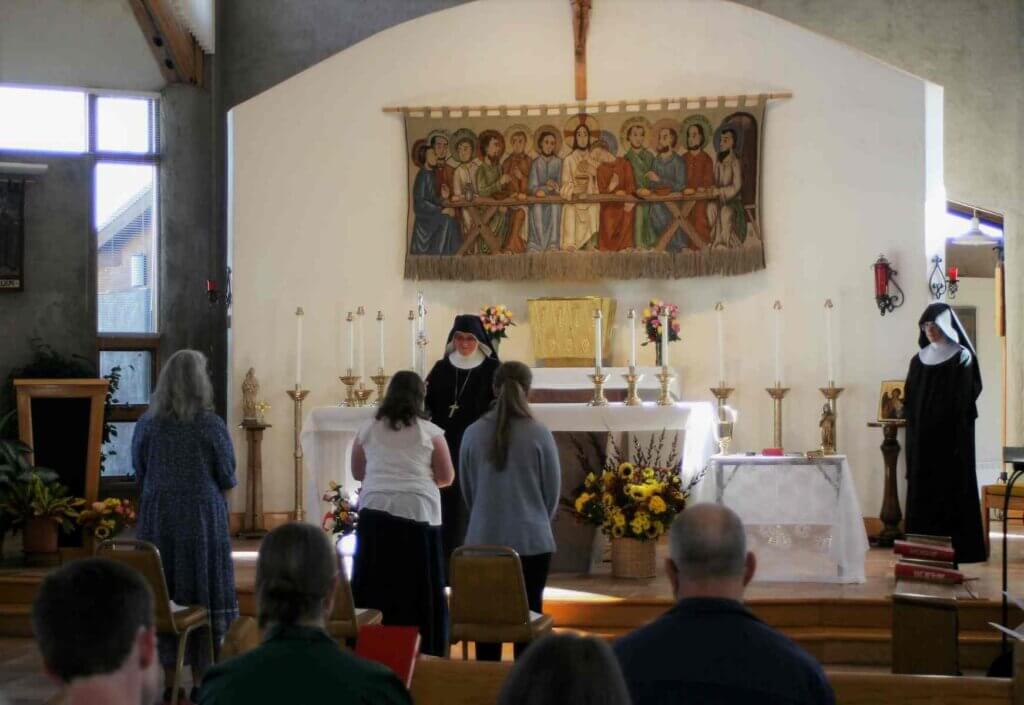
Oblates make their promises to Mother Maria-Michael, OSB
If our Church today could take these simple things, the Benedictine pillars of stability, obedience, silence, humility and prayer, and place them in the core of the Church, do you think it would look different? Would we hear different things? Let us assist the Church by embracing these pillars in our own lives. I offer this challenge to you, as you make your final oblation, and to all of us – the challenge of living the Benedictine virtues of stability, obedience, silence, humility, and prayer. The sacrifices you will make to live out these precepts of St. Benedict are no small ones, but in faith, we know that, “Never departing from this guidance, then, but faithfully observing his teaching in the monastery until death, we shall through patience share in the sufferings of Christ that we may deserve also to share in his kingdom. Amen” (Holy Rule, Prologue). This is what I truly wish for you: the Kingdom of God.
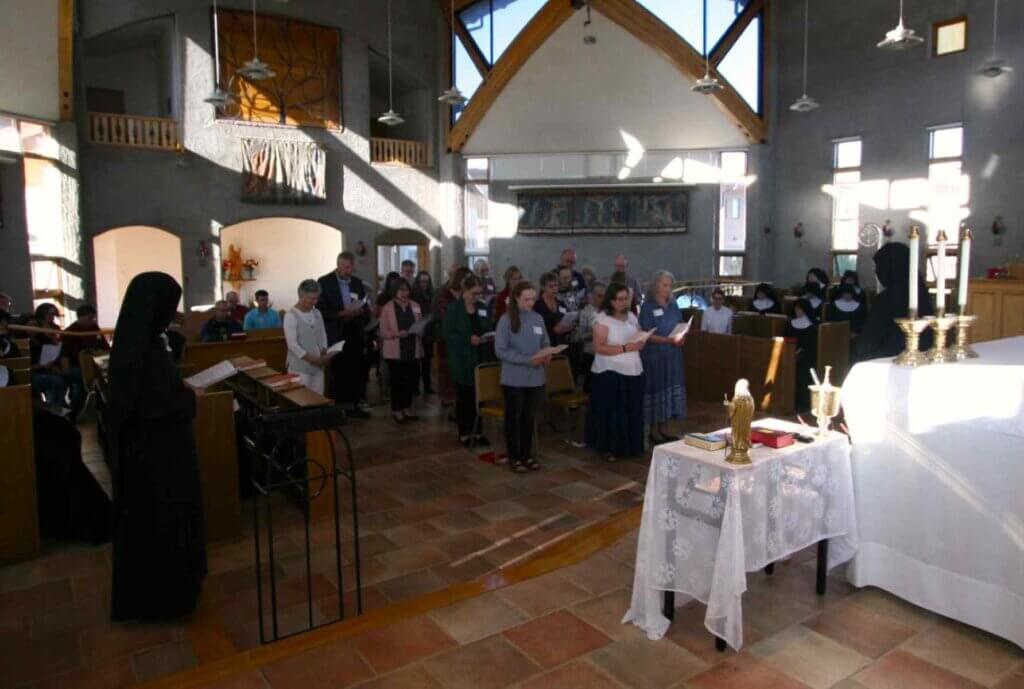
Oblates and nuns of the Abbey of St. Walburga sing the “Receive me, O Lord” chant



